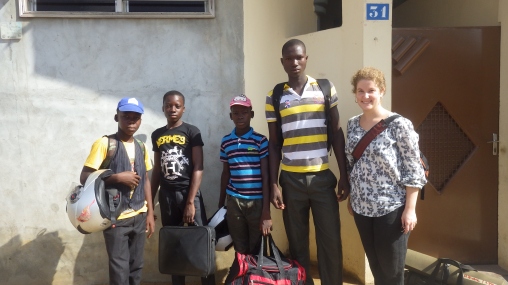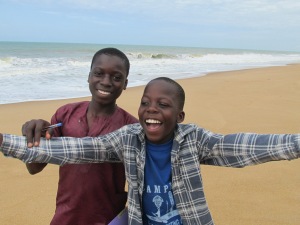How I Managed to Breach Decorum with both the President and his Wife (on Separate Occasions)
We have a new president in Benin. He is a cotton magnate billionaire who inspires very different feelings depending on who you talk to and which part of the country you are in. The elections were overall very calm and orderly, and no one accused anyone of cheating. Good job, Benin! I’m proud of your election conduct!
I never had much contact with the former President, Yayi Boni . Every once in a while he would fly over my house in Bante in his helicopter, inspiring awe in the children. There is, as far as I know, only one helicopter in Benin, and so you always knew it was the president flying over. The helicopter was provided by America’s own Hunt Oil as part of the compensation for conducting oil exploration in Benin. It has since crashed, while it was being used by the incumbent party’s presidential candidate to travel. No one was hurt, except for perhaps Beninese morale, as it is unclear whether there is or will be a replacement helicopter to signal the people of Benin that their president is on the move.
Anyway, I digress. This is a story about me making an ass out of myself, not a story about a helicopter.
In my neighborhood, an army general was running for president. He had no chance of winning, and in fact was defeated in the first round of elections, along with thirty-some other candidates. The vote between the two remaining candidates would be in a couple of weeks. After this first round of elections, I suppose Patrice Talon (at the time one of the remaining candidates, and now the newly installed president) wanted to talk about an alliance (or something) with the General in my neighborhood. I was on the street buying tofu, and all of a sudden, several very nice SUVs leave the General’s house and start passing in front of me.
I’m squinting through the SUV windows, trying to see who is inside. The man in the passenger’s seat of the nicest car smiles and waves at me. Thanks to my many and varied experiences with sexual harassment in Benin, my first instinct when a man waves at me is not to wave back anymore, but to remain stoic. As the car pulls away, and my face unsquinches from trying to look through the glass, my neighbor selling the tofu begins to berate me: “When Patrice Talon waves at you, you wave back!! Don’t you know he is going to be president?”
Well, shoot. What can you do? I would like to remove some of the blame from myself by saying that I think his campaign photos were photoshopped a bit, because his face was plastered everywhere in the city and I didn’t recognize him in person. Oh well.
Then, I found out that Patrice Talon’s wife was going to come to a gender equality event hosted by the Peace Corps at the US Ambassador’s house. How exciting, I thought, to have the first lady come and support such an important cause! I was assigned to be the photographer for the night, and was told that the people at the gate would let us all know when the first lady arrived.
The night of the event, I was in the swing of things, taking photos of all of the guests as they arrived. There was a banner with the Peace Corps and other partner organizations’ logos on it, and I was supposed to try to get a shot of everyone in front of it. I was having fun, joking with the guests, and snapping away.
Two women came in and I said “Oh! Let’s get a picture!” They seemed hesitant, so I said “When you’re as pretty as you are, it would be sad not to take a photo!” while kind of slapping the arm of one of the women in a friendly way. They looked a bit perplexed, but then let me take the picture. Soon after, the Ambassador rushes over and greets the First Lady, asking me if they can get a picture together.
“Of course!” I said, inwardly cringing at the bro-slap on the arm and my jocular tone directly preceding. Luckily, the First Lady didn’t seem to hold a grudge and didn’t complain when I followed her around for much of the night snapping photos.
I don’t think I have much of a future in Beninese politics.

